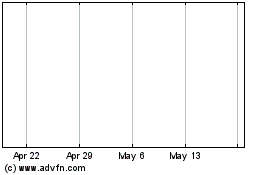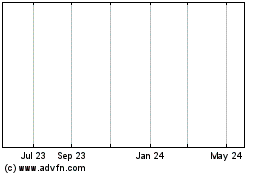Treasury's Lew Calls For Swift Action on Debt-Limit Increase
October 02 2015 - 1:20PM
Dow Jones News
WASHINGTON—Failure to reach agreement on a range of fiscal
deadlines risked jeopardizing the U.S. economy's recent gains,
Treasury Secretary Jacob Lew said Friday.
Mr. Lew addressed a meeting of financial industry executives one
day after he notified Congress that the Treasury would be unable to
rely on extraordinary measures to pay the country's bills on or
around Nov. 5 unless Congress raises the federal borrowing limit.
It has been employing those measures since mid-March, when a prior
suspension of the debt limit expired.
"We've seen over the last year and a half that since Congress
reached an agreement not to have fights every six months over
either the budget or the debt limit, it's led to greater
confidence," Mr. Lew said on Friday. "It's actually helped to
stimulate stronger growth in the U.S. economy."
Financial markets have in previous debt-limit standoffs taken
elaborate steps to prepare for a potential disruption in Treasury
markets if the government is forced to suspend certain
payments.
He said Congress should increase the federal borrowing limit,
currently at $18.1 trillion, as soon as possible. "They just have
to do it," he said. "We've been through this several times. … There
are no good alternatives."
Tim Pawlenty, the former Minnesota governor who now heads the
Financial Services Roundtable, a trade group, encouraged bank
executives visiting Washington on Friday to press lawmakers for a
debt-limit fix at meetings later in the day.
"It's like 'dining and dashing' where you eat the meat and then
run out without paying," said Mr. Pawlenty, who moderated a
discussion with Mr. Lew. "So we want to remind them if you've
already spent the money, you have to be able to have the
authorization to pay the bills."
Two other debt-limit estimates released Friday broadly confirmed
the Treasury's latest analysis of when it would be unable to use
extraordinary measures.
The Bipartisan Policy Center, a Washington think-tank that has
maintained reliable estimates in the past, said the Treasury could
run out of cash in mid-to-late November. The date is later than the
one provided by Mr. Lew because Treasury's estimate looks at when
the government will fund payments solely using daily cash flow, a
step that would be "unprecedented," said Shai Akabas, an analyst at
the BPC. The BPC estimate aims to pinpoint when the Treasury would
then be unable to pay bills.
Meanwhile, Republican staff on the Senate Budget Committee
estimated Friday that the Treasury would be unable to use
extraordinary measures, where it suspends certain investments to
free up cash to remain under the debt limit, between the end of
October and the middle of November.
The report pointed to the potential for government funding costs
to rise as the expiration of extraordinary measures nears. Demand
for Treasury assets that mature around when the government might
run out of cash to pay its bills has fallen during past standoffs,
raising yields on those assets. "This dynamic increases the costs
to the Treasury, thus aggravating the nation's fiscal condition,"
wrote William Beach, chief economist to the Senate Budget
Committee's Republican majority.
Mr. Lew said he was optimistic that Republicans and Democrats
would be able to work out any differences on spending and the debt
limit, but his remarks hinted at the possible limits of bipartisan
cooperation, particularly around his long-running effort to
overhaul taxes on U.S. multinationals' foreign earnings to pay for
a multiyear highway-funding extension.
"Obviously time is not our friend—there is not a lot of time
left in this Congress—and there are still differences," he said.
Senate Majority Leader Mitch McConnell (R., Ky.) has proposed a
different approach to replenish the highway trust fund that doesn't
rely on savings from a tax-code revamp.
While Mr. Lew didn't rule out a breakthrough, he offered a sober
assessment of the political prospects for a deal. "Frankly, it's
one that if we were in a different political climate, I would have
higher confidence," he said.
Mr. Lew said any deal to revamp corporate-tax rates couldn't
raise costs for the government, which has been a sticking point in
discussions with Republicans. "It's going to have to be
self-financed," he said.
Write to Nick Timiraos at nick.timiraos@wsj.com
Subscribe to WSJ: http://online.wsj.com?mod=djnwires
(END) Dow Jones Newswires
October 02, 2015 13:05 ET (17:05 GMT)
Copyright (c) 2015 Dow Jones & Company, Inc.
Treasury Group Ltd (ASX:TRG)
Historical Stock Chart
From Oct 2024 to Nov 2024

Treasury Group Ltd (ASX:TRG)
Historical Stock Chart
From Nov 2023 to Nov 2024
